- Home
- Hammond Innes
Maddon's Rock Page 15
Maddon's Rock Read online
Page 15
“Yes,” I said.
We listened. There was not a sound. I glanced at my watch. Five to eight. I could just see Bert grasp one of his boots. Then he was hammering at the end of the key. The sound seemed to shatter the stillness. I felt they must hear it. I thought they’d come running from all directions. The hammering stopped. Bert gave a grunt. The key rasped in the lock and we were in the shed.
It was the work of a moment to get the long green ladder out. We shut the door. But the key was firmly wedged. We had to leave it there, a dumb witness to our escape. It seemed an age that we walked with that ladder between us. But at last we were at the wall. We put our boots on and then up-ended the ladder. A moment later we were standing on the top of wall and pulling the ladder up after us. The lights of the prison stood out so clearly that I felt we must be seen. But the dark backcloth of the moors hid us. We tipped the ladder over the wall and set it up on the far side. In an instant we were down. We carried the ladder well clear of the wall and set it down in longish grass. And then we began to run.
We’d no compass unfortunately. But I knew the district too well to go wrong at this stage. We made downhill to the road that joins the Tavistock road to the Exeter road at Two Bridges, by-passing Princetown. And as we ran all hell let loose behind us. The silent prison seemed to flare into a mushroom of sound. It was a deep angry roar that grew in volume till it seemed to fill the night air.
The Borstal riot had started.
We made the road, crossed it and plunged up the slope beyond, bearing away to the right. Glancing back over my shoulder I saw an orange glow near the roof of one of the blocks. “Looks like they set fire to somefink,” Bert panted.
“Well, I hope to goodness they don’t need the ladders from that paint-shed to get the hoses up there,” I said.
“Gawd, I hope not.”
As if in answer, the great prison bell began to toll, drowning the roar of the riot with its deep tongue. “D’yer reckon that’s fer us or on acca’nt o’ the riot?”
“I don’t know,” I said.
The going became rougher now. We were no longer running. We were stumbling along. Once I pitched forward on my face. I scrambled to my feet without waiting to see what it was I’d fallen over.
“Can’t we let up a minute, Jim?” Bert said. “I got the stitch.”
“Not until we’re on the far side of the Exeter-Prince-town road/’ I told him.
“Wot’s them lights da’n there?” he gasped.
“That’ll be Two Bridges,” I answered. “There’s a pub there. The road to Dartmeet branches off on the hill right above it.”
“Don’t ’alf look nice da’n there,” he grunted. “I could jist do wiv a nice pint o’ wallop right nah. Don’t reck’n I can go much furver, chum.”
“Well, save your breath,” I said.
The headlights of a car lit the hill crest ahead of us. Then they swung in an arc and the car roared down the hill, the beam of the lights illuminating the hotel and the bridges. The water gleamed silver for an instant and then the car was a red light soaring up towards Princetown.
Bert suddenly stopped. “Let me get me bref a moment,” he gasped.
I looked back towards the prison. Lights were blazing. The headlights of several cars swung out of the main gates and turned towards Princetown. “Come on, Bert,” I said. “Give me your arm. We’ve got to get across that road before those patrol cars get through Princetown and down to Two Bridges.”
“Okay,” he said. Then, as we stumbled forward again, “D’yer reckon we got a chance, Jim?”
I didn’t reply. I had counted on an hour or two at least before our break was discovered. But now I thought our chances very slender. But we weren’t far from the road now. If we could cross that we might still have a chance.
“Wot say we pinch one o’ them cars a’tside that pub?” Bert said. “There’s free of ’em. You can see their sidelights.”
“People don’t leave their ignition keys in their cars these days,” I said.
Bert suddenly stopped again. “Listen!” he said. “Wot’s that? D’yer hear it?” His voice was scared. Faint behind us came the baying of dogs. “Oh, my Gawd!” Bert cried. And he started to run again, his breath coming in sobs.
The baying followed us as we ran, audible above the uproar from the prison. It was a horrible sound. We reached the crest of the hill. The going became easier. The lights of another car beat back the night as it drove towards Princetown. We were quite close to the road now. “When we’re across the road,” I panted, “well make for the river. That’ll put the dogs off.” And then I stopped, clutching Bert’s arm. The headlights of the car were swinging across the face of the hotel and a man was coming out of the entrance. He was making straight for one of the parked cars. “Bert,” I said, “are you willing to take a risk?”
“Wot d’yer fink I’m doin’ a’t ’ere?” he demanded with a flash of his old humour.
“Okay,” I said. “Watch that car. He’s on his own. If he turns up this way, get out in the road and lie down—just where it tops the rise there. He won’t have time to notice your prison clothes then. Lie as though you’d been hit by a car. If he stops call out to him for assistance. I’ll look after the rest. Watch there’s nothing coming the other way.”
“Okay,” he said. “Look—he’s movin’ off nah.”
The car, still with only its sidelights on, was beginning to move. It climbed slowly up to the road and hesitated. The headlights were switched on. Then they swung in a great arc of light till they were blazing straight up at us. The car began to gather way up the hill towards us.
Bert dived for the road. I crossed it and plunged down in the wet grass at the verge. The headlights blazed in the night as the car ground up the hill. Bert was half lying, half crouching in the road. I no longer heard the baying of the dogs, or the tolling of the bell or the uproar in the prison. All I heard was the engine of the car propelling it up the hill towards us. I felt quite cool.
The lights topped the rise, pointing skywards. Then, as the car reached the top of the hill, the headlights dropped to show Bert sprawled in the road, the fork with the sign-post that pointed to Dartmeet behind him. Bert waved his arm feebly. The car slowed and stopped. Bert called. The door opened and the driver got out. He was within a few feet of me as I rose from the grass verge. He only saw me in time to turn his head so that my fist hit him right on the chin.
“Okay, Bert,” I said as I staggered under the weight of the dazed man. Bert was already up. I glanced back towards the hotel at the bridge. All was quiet. But beyond the bridge the hill crest was ablaze with the lights of cars. Our margin of time was as narrow as that.
We bundled the driver into the back of the car. Bert dived in with him. I jumped into the driving seat and we were off. I took the right hand fork. The car was old, but she could do fifty all right. I kept the accelerator pedal right down all the time. In ten minutes we were pelting down the long hill into Dartmeet. I crossed the little hump-backed bridge and swung on to a track to the left that ran beside the babbling waters. I parked the car on the greensward among some tall gorse bushes.
Bert had already got the driver’s hands bound and his mouth gagged. He was busy tying the poor fellow’s feet. “I’ll try not to be long,” I said. “Fifteen minutes at the outside.”
Actually I was less than that. It was a long time since Henry Manton’s father had seen me. But he recognised me at once. I felt horribly ill-at-ease as I told him what I wanted. He shook his head sadly. But he made no comment, simply asking about my friend’s size. He left me standing in the hall. I heard a car roar past. In a few minutes he was back with a pile of clothes and some shoes. There was a suit of Henry’s—his son I knew was about my size. For Bert he had included an old suit of his own. Shirts, collars, ties, hats and raincoats—he’d missed out nothing. And as I bundled the clothes over my arm, he pressed a roll of notes into my hand. “There’s eighteeen pounds there,” he said. “I’m sorry it’
s not more. But that’s all I have in the house.”
I tried to thank him. But he pushed me towards the door. “Henry was fond of you,” he said quietly. “And I would not like Henry to feel that his was a fair-weather friendship.” He put his hand on my shoulder. “Good luck, my boy,” he said. “But I fear it’s a hard road you’ve started out on. Don’t worry about returning either the clothes of the money.”
And whilst I was still trying to thank him, he pushed me gently out into the night and closed the door. He understood my need of haste. That gesture of trust from a man I had not seen for several years warmed me. I hurried back to the car and we changed down there by the Dart, sinking our prison clothes with a stone in the dark, swift-flowing waters of the river.
Then I got the car back on to the road and continued south towards Totnes. But I didn’t go far. Below the village of Postgate the road crosses the Dart again by a narrow hump-backed bridge. That marked virtually the southern limit of Dartmoor and I guessed that if the police had yet set up check points, it would be on that bridge. Just beyond Postgate, therefore, at the top of the hill leading down to the bridge, I parked the car out of sight among the bushes. The poor wretched owner had been too scared, I think, to struggle at any time during the drive. His eyes stared widely up at me as I bent over him to apologise for the rough handling he’d had.
We left him then, firmly trussed up on the back seat of his car and hurried down the slope of the hill towards the river we could hear talking to the stones in the valley bottom.
The slope was steep and strewn with rocks. The night was unutterably black. There was no sound save the babble of the Dart hurrying over the rocks of the river bed. Our feet seemed to make a great deal of noise scrambling against the rocks or brushing through the dry heather twigs. Gradually we approached the river. But we could not see it. We could see nothing beyond a few yards. A light drizzle damped our faces and out of it bush and rock would suddenly materialise as a vague shadowy bulk in the night. An unearthly scream suddenly disturbed the peaceful pattern of sound made by the water. It was high pitched, shrill as a bat. We stopped. I listened, imagination galloping wildly. The outline of a bush showed like a crouching woman just in front of us. It seemed to move. There was a scuffling sound at its feet. Then something slid away quietly into the night. “Gor, love old iron,” Bert muttered. “Didn’t half give me a fright. Wot d’yer reckon it was, Jim?”
“Fox, maybe,” I said, and we went on.
We were close to the river now. The water slipped noisily among the rocks, drowning all other sounds. We entered a little belt of dwarfed trees. And as soon as we were among them, they closed about us as though there were no such thing as open moorland. Dead vegetation collapsed beneath our feet. Below this decayed carpet was rock—no earth, or grass, just a jumbled heap of moss-grown rocks, tumbled there by the river when this had been its bed. They were smooth and round, They moved under our feet. It was a dangerous spot to come scrambling in the dark.
It took us nearly twenty minutes to reach the water through that devilish patch of wood. But at last we reached a slab of rock and the air was cold and damp with the smell of water. We clambered down this slab and then we were in a jumble of black rocks with the water pouring past our feet, loud and insistent, whispering perpetually with a voice that seemed as slight as the rustle of wind through a patch of reeds, yet it drowned all other sound. We stood there for a moment looking down at that rush of water. We could just see it. It creamed white round the vague shapes of the rocks. Between these white, chattering frills, we sensed rather than saw the sleek black swirl of the water as it slid between the rocks.
“I don’t like the look of it,” Bert said. “Why don’t we go up and ’av a look at the bridge. Didn’t see no sign o’ lights as we came da’n. Mebbe there ain’t no police check there. Even if we get through this, we’re goin’ ter look pretty peculiar specimens till we dry.”
I hesitated. With the water swirling wickedly among the rocks in front of me, I was greatly tempted. And yet it was a risk. If we were caught that way we’d kick ourselves. “At any rate we could go up near the bridge and when a car comes down we could see whether there was a check?” Bert added. That seemed reasonable. “All right,” I said. And we turned along a path that ran close beside the river.
Soon we were out of the wood. The path was no longer rock and mud, but grass. We were in the open and though we could see nothing, yet it seemed vaguely lighter. I began to be worried lest we should come upon the bridge without knowing it. The river was not so noisy here and I had the impression that it was wider and consequently less deep. I suddenly stopped. I didn’t like being out in the open like this. Beyond the river I knew there were woods. Once among the trees we would be clear of the moors and on our way to Ashburton and Totnes. “We’ll cross here,” I told Bert.
He accepted my decision without question. I think he was getting worried too. We grasped each others hands and stepped off the bank into the swift flowing river. The water was icy cold. It came just above our knees, sweeping against our legs with a steady pressure. Pebbles and small rocks moved under our feet. We waded out, keeping the flow of the water on our right. Gradually it deepened until the water was up to our loins, making us gasp with the shock of its cold touch. We must have been about halfway across when Bert’s hand tightened on mine and he half swung me round so that I was facing upstream. The hills were a black hump in silhouette against the lights of a car coming from Postgate. In a moment, they would top the crest and as the car started on the descent into the valley, the headlights would swing across us. Without a word we plunged forward.
But before we had reached the further bank, the car had reached the top of the hills. The twin beams of the headlights dipped towards us. I suddenly ducked my body into the water, pulling Bert with me. We crouched there in the middle of the stream with the water swirling round our necks, gasping for breath as the icy current seeped through our clothes. The headlights dipped. We saw the wood we had padded through as a huddle of brightly-lit trees and deep shadows, leaning towards the river as though charging pell mell into the rock-torn stream. The lights swept across the further bank. It was bare of cover, a pleasant greensward running up to the line of woods that clothed the further hillside. They illumined for an instant the dark, smooth surface of the water where we crouched. The branch of a tree swept passed my face. I saw the shadow of my head move across the surface of the water. I turned to look at Bert and caught a glimpse of his teeth chattering with the cold. And then the headlights swept on and the bridge stood clear before my eyes. It was an old hump-backed bridge of mellow lichen-covered stone. Two black recesses marked the spans as they bridged the river. And standing by the parapet was a man in a blue peaked cap. That bridge was scarcely forty paces upstream from where we crouched in the water.
It was only a momentary glimpse I had. Then the headlights swung away and all was darkness again. I glanced at the hillside behind us. It streamed with light as the car came diagonally down it on the road to the bridge.
“Quick,” I whispered in Bert’s ear. And we began scrambling for the bank. We reached it and pulled ourselves out on to the short turf. Our clothes were heavy with water. It was wretchedly cold. For the first time I realised that there was a breeze—it cut like a knife through our soggy clothes. I looked back as we lay gasping for breath. As I did so, the car swung on a bend. “Keep still,” I whispered to Bert. The headlights were full on us. Our shadows lay on the grass—two black and shapeless humps. The shadows moved and lengthened. The car’s headlights swung away. The bridge stood out again clear as in an etching. The man in the peaked cap was waving a torch. The car halted on the bridge. We could hear voices, a vague sound just topping the smooth hustle of the river. All about us was a diffused light. A pony’s droppings looked like a huge dunghill so close was my face buried to the ground. Here and there were low bushes of gorse and bramble. And fifty yards up the slope of the hill the fringe of the woods mocked us.
The car moved on. Its headlights were swallowed up in the woods. The red tail-light disappeared. All was black again. A torch flashed by the bridge. Footsteps sounded sharp and frosty on the macadam of the roadway. We got up then and made for the woods. A voice suddenly called out. Headlights instantly flashed on, bathing all the open space in which we ran with a bright artificial light. We flung ourselves to the ground, scarcely daring to breathe.
Surely they must have seen us. Why the shout? Had they been waiting for us? We lay motionless, two frightened, wretched heaps of sodden clothing in a prickle of gorse that went unnoticed in our sudden scare. A car engine purred. The headlights swung away from us and the police car disappeared up the road through the woods.
Darkness again and silence.
Cautiously we got to our feet. My face and hands were scratched with gorse and bramble. But we were out of trouble for the moment. We hurried then into the shelter of the woods.
Ten minutes later we were standing in a clearing high up on the wooded hillside. We were panting and our clothes clung to us like wood pulp. The heat of our exertions rose in a thick steam. But I don’t think in that moment we gave a thought to our dilapidated condition. We were looking downhill, across the clearing, to where the tree tops on the further side stood etched against an orange glow that flared up into the night. It shone on the low bellies of the drizzle-laden clouds so that they glared redly like a backcloth in Berlioz’s Damnation of Faust.
“It’s a fire, that’s wot it is,” Bert said. He suddenly gave a cackling laugh. “Strewf!” he chuckled. “That’s two fires in one day, ca’nting the one the Borstal fellers started in the prison. I ain’t ’ad such a riotous evenin’ since I was a nipper an’ saw a pub in Islington, a shop in the Gray’s Inn Road an’ a tram-car at King’s Cross, all free of ’em on fire the same night. Gosh! I wouldn’t mind warmin’ meself at that blaze. Wot d’yer reckon it is, a rick?”

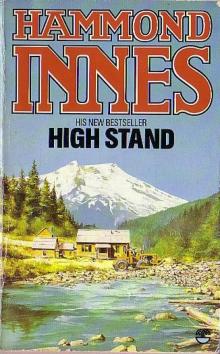 High Stand
High Stand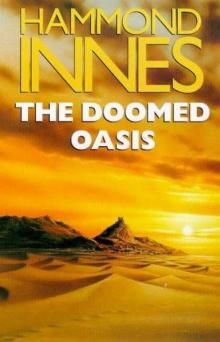 The Doomed Oasis
The Doomed Oasis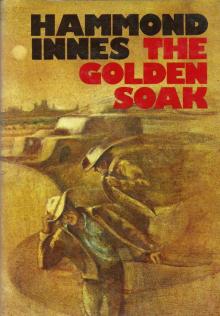 Golden Soak
Golden Soak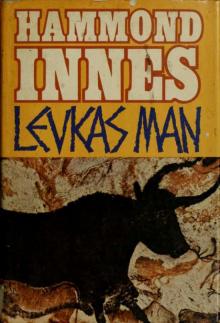 Levkas Man (Mystery)
Levkas Man (Mystery)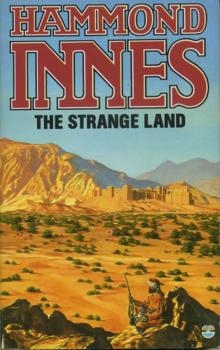 The Strange Land
The Strange Land Dead and Alive
Dead and Alive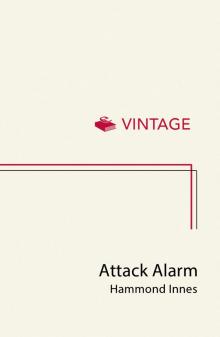 Attack Alarm
Attack Alarm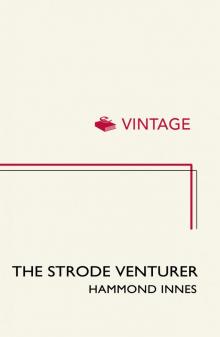 The Strode Venturer
The Strode Venturer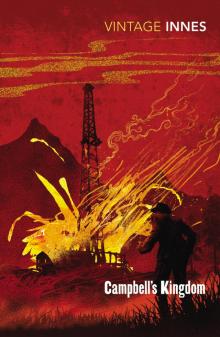 Campbell's Kingdom
Campbell's Kingdom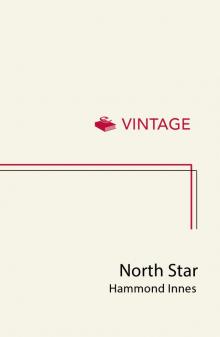 North Star
North Star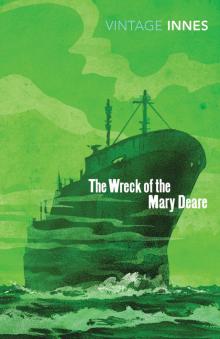 The Wreck of the Mary Deare
The Wreck of the Mary Deare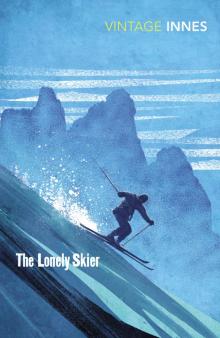 The Lonely Skier
The Lonely Skier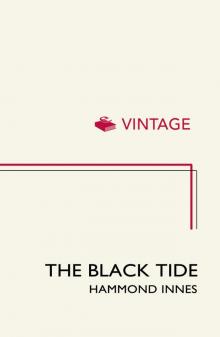 The Black Tide
The Black Tide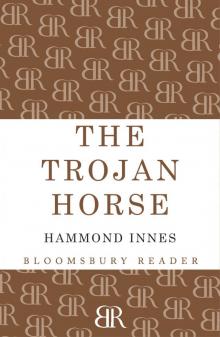 The Trojan Horse
The Trojan Horse Medusa
Medusa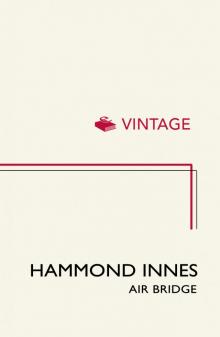 Air Bridge
Air Bridge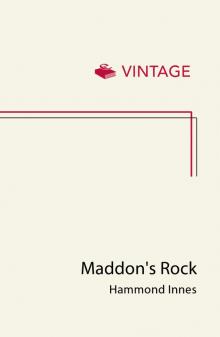 Maddon's Rock
Maddon's Rock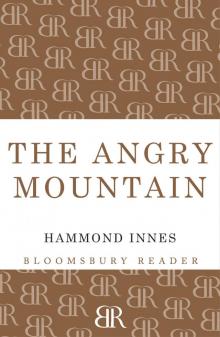 The Angry Mountain
The Angry Mountain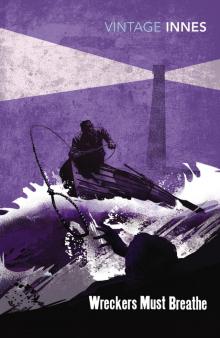 Wreckers Must Breathe
Wreckers Must Breathe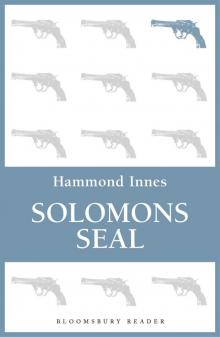 Solomons Seal
Solomons Seal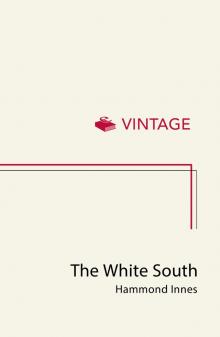 The White South
The White South